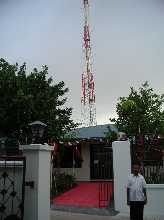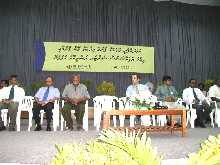|

Communication
towers like this are a common sight in the islands these days.
This was a far cry from the situation just 40 years
ago. Before 1960, the only way to send a message to an
island was to send a letter on a sailing boat and hope one
would be lucky if the letter reached in a month. Things
improved slightly in the 60s, when RT sets were installed in
the atoll offices. Soon walkie talkies were given to
island chiefs. Walkie talkies
themselves were a revolution of sorts. Katheebs made a
pretty scene in the island beaches sporting strange looking
devices and saying "Hello, hello .....over". For
many islanders these were the first English words they would
hear. It spawned a whole new culture in the islands,
with children making toy walkie talkies. While walkie talkies
were a definite improvement in communication it made life very
difficult for the katheebs. They had to go to the beach
at the appointed times to contact the atoll office, come rain
or sun. Many katheebs build huts on the beach called
"walkie talkie houses".
We have come a long way since then. The Maldives telecom company Dhiraagu has been improving its services and making them more affordable in recent years. Thus mobile phone and Internet services have come down considerably in recent years. However, the small size of the market and the fragmented nature of the country is a severe constraint on such efforts.

In
September 2001 Dhiraagu marked the inauguration of house to
house telephones in Kulhuduffushi island. The government of Maldives realizes that the way forward is through the information superhighway. In the last few years it has taken some very constructive steps to foster information technology in the country. Reducing the import duty on computers is one such step. More recently the government has announced its intention to provide low priced Internet connections to all schools in the country during the next academic year. | 



